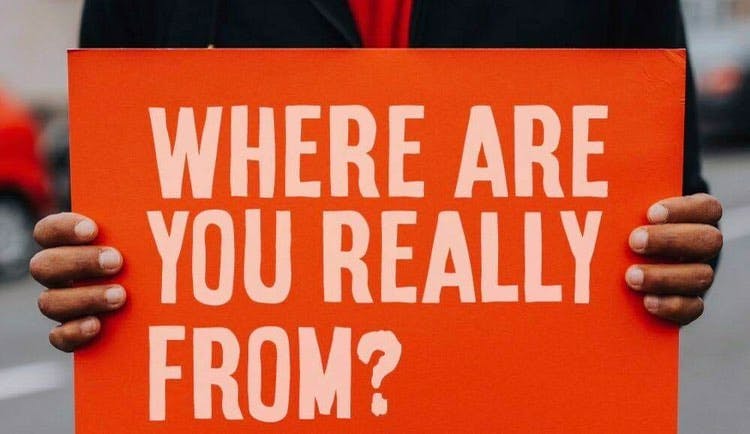When you ask me where I’m from, I know what the next question will be. When you argue for assimilation over integration for immigrants in class, I stay quiet. When you start a blog that argues cultural appropriation is not real and lists the benefits of Empire, I’m unsurprised. When you say we should all be grateful that we don’t live in a poor third world country in a seminar, I pretend I misheard. You go to Black Lives Matter protests but tell me I’m making things too racial, (maybe you should take those Instagram posts down). You tell me we should be more ‘objective’. Please tell me more about your gap year travelling. You tell me my name is too hard to pronounce. People protest racism and you post your Winston Churchill t-shirt on Instagram. Maybe I should take it as a compliment when you tell me brown girls are your type. You tell me you’ve not watched the lecture or done the readings and yet speak with the emboldened entitlement that comes so natural to white men. You argue it’s only the fault of poor countries that they’re poor and the lecturer says he sees both sides. Is it just me hearing this? Maybe I did mishear? Am I even in the room? Do you see me?
It should come as no shock to learn that 85% of professors employed at UK universities are white, with not even 1% being black, according to data from the Higher Education Statistics Agency. I’m a final year Politics and IR student and I still have yet to be taught by somebody black. For Politics, I have only been taught by one person of colour, and for IR it isn’t much better. Our conceptions of what intelligence looks like are based around white men. How can we see intelligence in ourselves when the world does not? The white men lecturing me on decolonisation see no irony. Even the content of the modules I study reflects this, with a compulsory Politics module being specifically dedicated to the study of white male philosophers, many of whom held extremely racist and sexist views. These philosophers didn’t even see me as a person but still I have to legitimise them in my studying them. White people, especially white men, have the luxury of studying these philosophers as just people who had ideas, not people who would deny them rights. Locke’s role in advancing colonisation and slavery whilst advocating for equality is just an essay question for you, an interesting debate. These issues are separate for white people, and the reason it is acceptable for the heinous views of philosophers to take up a brief 5 minutes on the slide at the end of the lecture. The white people in my seminars defend our study of these philosophers, they say what’s in the past is in the past, but who stands up for us? The white lecturers and seminar tutors act as enablers. I’ve learned to dread the weeks we study race and immigration, but for you it’s just another topic in another week. While you have the luxury of seeing yourself in everyone, actors and lecturers alike, I get to count how many people that look like me are in the room. The reading lists don’t look like me, they look like you. I go home to see people that look like me, but every room here looks like you.
To the institution that brands itself as radical, tolerant and accepting, your disregard for my existence says otherwise. You use us for brochures but don’t care that we’re navigating spaces that we were never intended to exist in. In 2017-18, 88% of white people at Sussex were awarded a 2:1 or above, yet this figure was 14% lower for BAME people. That doesn’t make for good advertising, does it? To the white men in my classes, I know I’ll get to watch you on TV with a suit on in the House of Commons, society has never made you feel out of place, the world is yours after all. I censor what I say to you, an agreeable token, but you don’t offer me that same courtesy. You don’t even see me. My invisibility contrasted by my skin colour. For you race and immigration are a debate, for me they define my existence, so no I cannot make things less racial for you. Constantly uncomfortable, I’m still supposed to make it easier for you. Our lives characterised by our skin, sorry we can’t be ‘objective’. Our being here is radical in itself but ask yourself, at what cost?
People of colour at Sussex suffer collective trauma at hands of the very institution that’s supposed to protect them. There is a reason why your stories sound just like mine. We search for solace and reassurance in each other, we have only each other. Your pain, your trauma, your tears are not just yours. The collective trauma we endure at predominantly white institutions will outlive even us. You aren’t alone.

